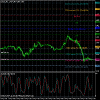- Domov
- Komunita
- Noví obchodníci
- Is compounding necessary?
Advertisement
Edit Your Comment
Is compounding necessary?
Členom od Oct 04, 2012
3 príspevkov
Oct 10, 2012 at 10:49
(upravené Oct 10, 2012 at 02:12)
Členom od Oct 04, 2012
3 príspevkov
As a forex trader, you would want to earn extra profit in trading. If you wanted to get higher profit, you must set higher capitals for your trading. come to think of it, the higher the capital, the higher the chance of earning bigger profits. Several traders once told me to use compounding. Is compounding really necessary to make a lot in forex trading? Share your insights.
Členom od May 06, 2011
14 príspevkov
Členom od Jan 14, 2010
541 príspevkov
Oct 15, 2012 at 07:31
Členom od Jan 14, 2010
541 príspevkov
As with all other things, you must use compounding when needed and according to your risk preference.
As Einstein said: "compound interest is the greatest mathematical discovery of all time".
If you have a profitable system and are not in a rush to withdraw your profits, then compounding would definitely speed up your profits, although this isn't a must. Best way is to experience it on your own - try compounding your profits for a month and see the difference.
As Einstein said: "compound interest is the greatest mathematical discovery of all time".
If you have a profitable system and are not in a rush to withdraw your profits, then compounding would definitely speed up your profits, although this isn't a must. Best way is to experience it on your own - try compounding your profits for a month and see the difference.
Členom od Oct 04, 2012
3 príspevkov
Oct 19, 2012 at 07:20
Členom od Oct 04, 2012
3 príspevkov
SaltyWaters posted:
If you don't compound and you don't increase the lot size indeed your risk is reduced.
When compounding the risk will be the same as when you started all along the way regardless.
It's only risky if you do the math wrong and your compounding formula is screwed up.
I agree. Following a right formula would be the better way to practice compounding.
Členom od Oct 04, 2012
3 príspevkov
Oct 19, 2012 at 11:49
Členom od Oct 04, 2012
3 príspevkov
James_Bond posted:
As with all other things, you must use compounding when needed and according to your risk preference.
As Einstein said: "compound interest is the greatest mathematical discovery of all time".
If you have a profitable system and are not in a rush to withdraw your profits, then compounding would definitely speed up your profits, although this isn't a must. Best way is to experience it on your own - try compounding your profits for a month and see the difference.
Thanks for your insight. I think compounding is a great idea to gain capital quickly but one must be aware of the risks that goes along with it.
I believe it would be better and safe if one would set aside a profit and then try compounding some of their money just to avoid losing all the investment.
Členom od Aug 22, 2012
165 príspevkov
Oct 20, 2012 at 07:19
Členom od Aug 22, 2012
165 príspevkov
Personally I think compounding is a great idea, but not at a rate of 100%. So if you had an account of say 10k and traded a lot size of 0.1, and built your account up to 20k, to have a compounding effect and reduce risk, rather then increase your lot sizes to 0.2 you could increase them to 0.15 (50% compound rate) So in short, compounding at a rate of less then 100%, in my opinion, is the way to go.
Členom od Jan 14, 2010
541 príspevkov
Oct 22, 2012 at 08:58
Členom od Jan 14, 2010
541 príspevkov
incometrader posted:
Personally I think compounding is a great idea, but not at a rate of 100%. So if you had an account of say 10k and traded a lot size of 0.1, and built your account up to 20k, to have a compounding effect and reduce risk, rather then increase your lot sizes to 0.2 you could increase them to 0.15 (50% compound rate) So in short, compounding at a rate of less then 100%, in my opinion, is the way to go.
I agree. There's no point to compound 100% as you're compounding risk along with returns. I would average it - compound 50% of the profits only - that way you'll average out the best method without having to worry what method is better.
Important to note that compounding should be used only after your trading system proves its effectiveness.
Členom od Apr 07, 2011
69 príspevkov
Oct 22, 2012 at 09:17
Členom od Apr 07, 2011
69 príspevkov
Is it just me or does anyone else find this thread (and some posts - no offence) a little strange?
(example - numbers are rounded to nearest pound to keep it simple...)
Balance: $10,000
Risk: 2% - $200.00 (at this point, assuming a loss is $200 and a win is $400 (1:2 R;R)
Loss: $200.00 - Account at close is $9,800 - 2% is now = $196
Loss: $196.00 - Account at close is $9604 - 2% is now = $192 (rounded)
Loss: $192.00 - Account at close is $9412 - 2% is now = $188 (rounded)
Win: $376.00 - Account at close is $9788 - 2% is now = $196 (rounded)
Win: $392.00 - Account at close is $10,180 - 2% is now = $204 (rounded)
Win: $408.00 - Account at close is $10,588 - 2% is now = $212 (rounded)
Win: $424.00 - Account at close is $11,012 - 2% is now = $220 (rounded)
Win: $440.00 - Account at close is $11,452 - 2% is now = $229 (rounded)
Loss: $229.0 - Account at close is $11223 - 2% is now = $224.0 (rounded)
So forth...
This is compounding^ Simple and COMPLETELY necessary. Your risk stays the same throughout... In this case it is ALWAYS 2% of your closing balance....
I am not looking at getting into a debate about this, if this is what the OP was referring to, then take my advice on it; if you do not trade this way, then you`re lost already....
(example - numbers are rounded to nearest pound to keep it simple...)
Balance: $10,000
Risk: 2% - $200.00 (at this point, assuming a loss is $200 and a win is $400 (1:2 R;R)
Loss: $200.00 - Account at close is $9,800 - 2% is now = $196
Loss: $196.00 - Account at close is $9604 - 2% is now = $192 (rounded)
Loss: $192.00 - Account at close is $9412 - 2% is now = $188 (rounded)
Win: $376.00 - Account at close is $9788 - 2% is now = $196 (rounded)
Win: $392.00 - Account at close is $10,180 - 2% is now = $204 (rounded)
Win: $408.00 - Account at close is $10,588 - 2% is now = $212 (rounded)
Win: $424.00 - Account at close is $11,012 - 2% is now = $220 (rounded)
Win: $440.00 - Account at close is $11,452 - 2% is now = $229 (rounded)
Loss: $229.0 - Account at close is $11223 - 2% is now = $224.0 (rounded)
So forth...
This is compounding^ Simple and COMPLETELY necessary. Your risk stays the same throughout... In this case it is ALWAYS 2% of your closing balance....
I am not looking at getting into a debate about this, if this is what the OP was referring to, then take my advice on it; if you do not trade this way, then you`re lost already....
"Taking responsibility is the cornerstone to a winning attitude"
Členom od Aug 22, 2012
165 príspevkov
Oct 22, 2012 at 10:22
Členom od Aug 22, 2012
165 príspevkov
domgilberto1 posted:
Is it just me or does anyone else find this thread (and some posts - no offence) a little strange?
(example - numbers are rounded to nearest pound to keep it simple...)
Balance: $10,000
Risk: 2% - $200.00 (at this point, assuming a loss is $200 and a win is $400 (1:2 R;R)
Loss: $200.00 - Account at close is $9,800 - 2% is now = $196
Loss: $196.00 - Account at close is $9604 - 2% is now = $192 (rounded)
Loss: $192.00 - Account at close is $9412 - 2% is now = $188 (rounded)
Win: $376.00 - Account at close is $9788 - 2% is now = $196 (rounded)
Win: $392.00 - Account at close is $10,180 - 2% is now = $204 (rounded)
Win: $408.00 - Account at close is $10,588 - 2% is now = $212 (rounded)
Win: $424.00 - Account at close is $11,012 - 2% is now = $220 (rounded)
Win: $440.00 - Account at close is $11,452 - 2% is now = $229 (rounded)
Loss: $229.0 - Account at close is $11223 - 2% is now = $224.0 (rounded)
So forth...
This is compounding^ Simple and COMPLETELY necessary. Your risk stays the same throughout... In this case it is ALWAYS 2% of your closing balance....
I am not looking at getting into a debate about this, if this is what the OP was referring to, then take my advice on it; if you do not trade this way, then you`re lost already....
That's right your risk stays the same if your compound rate stays the same. But, if you want to reduce your risk as you grow your account, you may want to compound at a rate of 50% for example. What you're saying is fine for something like a term deposit where there is no risk, but with FOREX (as risky as it can be) it's wise to reduce risk.
Členom od Jun 21, 2011
2 príspevkov
Oct 22, 2012 at 10:24
Členom od Jun 21, 2011
2 príspevkov
Try one of analytical programs that will help with your position sizing, you can test it with your results and will see what is the best choice for you.
https://t.me/aondrejicka
Členom od Apr 07, 2011
69 príspevkov
Oct 22, 2012 at 10:52
Členom od Apr 07, 2011
69 príspevkov
incometrader posted:
That's right your risk stays the same if your compound rate stays the same. But, if you want to reduce your risk as you grow your account, you may want to compound at a rate of 50% for example. What you're saying is fine for something like a term deposit where there is no risk, but with FOREX (as risky as it can be) it's wise to reduce risk.
I completely disagree. There is no logical reason to decreasing your risk percentage of your closing balance? If you choose 2% risk profile of your closing balance then it is always 2% of your closing balance...
Why would you decrease your risk profile on winning trades, and what, keep it in the same on losses? Or decrease it then too.... If you knew what you were talking about you`d fully understand the implications through back-testing and vigorously understanding how MM effects your bottom line through messing around with your risk profile....
I am not sure why I am even bothering explaining this or getting involved lol.
Do what AO said above^.
"Taking responsibility is the cornerstone to a winning attitude"
Členom od Aug 22, 2012
165 príspevkov
Oct 22, 2012 at 11:01
Členom od Aug 22, 2012
165 príspevkov
domgilberto1 posted:incometrader posted:
That's right your risk stays the same if your compound rate stays the same. But, if you want to reduce your risk as you grow your account, you may want to compound at a rate of 50% for example. What you're saying is fine for something like a term deposit where there is no risk, but with FOREX (as risky as it can be) it's wise to reduce risk.
I completely disagree. There is no logical reason to decreasing your risk percentage of your closing balance? If you choose 2% risk profile of your closing balance then it is always 2% of your closing balance...
Why would you decrease your risk profile on winning trades, and what, keep it in the same on losses? Or decrease it then too.... If you knew what you were talking about you`d fully understand the implications through back-testing and vigorously understanding how MM effects your bottom line through messing around with your risk profile....
I am not sure why I am even bothering explaining this or getting involved lol.
Do what AO said above^.
I give up... You've completely missed the point...

forex_trader_43716
Členom od Aug 06, 2011
326 príspevkov
Oct 22, 2012 at 22:41
Členom od Aug 06, 2011
326 príspevkov
Here's what I do: (1) Allow compounding at 100% of profit because, as already noted in this thread, risk remains exactly the same. Only the dollar value of risk increases as equity grows, not the percent risk factor. (2) When capital is doubled I withdraw 1/3 of my account balance, which allows account funds to grow whilst I take profit off the table. Now my risk factor applies to 2/3 of my equity, which lowers the dollar value of risk but leaves the percent risk factor the same.
The only way to reduce risk is to reduce the percent risk factor you apply to equity, or stop trading. With that said, it's good to find a thread focussing on money management. Is anyone up for a discussion on Risk of Ruin?
The only way to reduce risk is to reduce the percent risk factor you apply to equity, or stop trading. With that said, it's good to find a thread focussing on money management. Is anyone up for a discussion on Risk of Ruin?
Členom od Aug 22, 2012
165 príspevkov
Oct 22, 2012 at 23:35
Členom od Aug 22, 2012
165 príspevkov
"Is anyone up for a discussion on Risk of Ruin?" That's an excellent thing to discuss. I've 'ruined' my account a couple of times, and due the nature of my trading it's something I need to reduce.
Členom od Jan 14, 2010
541 príspevkov
Oct 23, 2012 at 13:37
Členom od Jan 14, 2010
541 príspevkov
@myfxpt Problem is you're chasing your return as you need to double your money before you take out profit - if you have a big loser before your withdrawal, it will obviously hurt you a lot more than if you were not to compound at 100% - this is simply a question of when will a losing streak will happen; if you were to know that you would also know when to compound at 100% and when at 0%.
What about risk of ruin? I just look at it to see if I'm doing fine - are you using it differently?
What about risk of ruin? I just look at it to see if I'm doing fine - are you using it differently?
Členom od Jan 14, 2010
541 príspevkov
Oct 23, 2012 at 13:37
Členom od Jan 14, 2010
541 príspevkov
incometrader posted:
"Is anyone up for a discussion on Risk of Ruin?" That's an excellent thing to discuss. I've 'ruined' my account a couple of times, and due the nature of my trading it's something I need to reduce.
😀
Členom od May 08, 2012
316 príspevkov
Oct 23, 2012 at 19:54
Členom od May 08, 2012
316 príspevkov
Boy, lots of cavalier statements on this thread. Everyone should be concerned about risk of ruin, and not just the "blow smoke up your ass" percentages that are provided. All things being equal, things are never equal. Today is not like yesterday, Tomorrow will not be like today. If you are trading an EA, and are compounding, you are a fool, and you are your money will soon be parted. Always, always, ALWAYS, transfer profits into a separate account until you have recaptured your initial investment. Now you are playing with the houses money. After that, if you want to 100% compound, have it. I think a more rational approach, after recouping your seed money would be to let half the profits ride, and transfer half the profits out weekly.
War is when your government tells you who the enemy is. Revolution is when you figure out, for yourself, who the enemy is.
Členom od Jan 14, 2010
541 príspevkov
Oct 25, 2012 at 15:37
Členom od Jan 14, 2010
541 príspevkov
@Michigander everyone has their own preference. I do agree that risk of ruin is an important factor in determining the risk of a system and therefore helping you to decide how much should you compound. I think any system which needs at least 100 trades to be ruined, can be safely compounded.

forex_trader_43716
Členom od Aug 06, 2011
326 príspevkov
Oct 31, 2012 at 00:51
Členom od Aug 06, 2011
326 príspevkov
It is about preferences and circumstances. If you start out with, say, $500 capital and average 20% per month return, you will most likely want to build your capital before withdrawing profit. Alternatively, if you start out with $50,000 capital and average 20% per month return, you will likely want to withdraw some profit. The decision to compound is usually start-up capital related, in that the more we start with, the less need we have to compound.
As I have already said, my plan is simply to double my capital and withdraw 1/3 of profits. This allows capital growth and a reward for effort. When my capital is sufficient to generate the monthly income I need, and if my monthly earnings have proven to be stable and reliable for several months, then my drawings increase to 90%-95% on earnings, leaving 5%-10% growth capital in my account. This keeps me up with inflation.
As I have already said, my plan is simply to double my capital and withdraw 1/3 of profits. This allows capital growth and a reward for effort. When my capital is sufficient to generate the monthly income I need, and if my monthly earnings have proven to be stable and reliable for several months, then my drawings increase to 90%-95% on earnings, leaving 5%-10% growth capital in my account. This keeps me up with inflation.
Členom od Jan 14, 2010
541 príspevkov
Nov 01, 2012 at 13:54
Členom od Jan 14, 2010
541 príspevkov
@myfxpt I agree. In any case, this question can be only answered once you're profitable, and since most traders aren't, they never get to it.

*Komerčné použitie a spam nebudú tolerované a môžu viesť k zrušeniu účtu.
Tip: Uverejnením adresy URL obrázku /služby YouTube sa automaticky vloží do vášho príspevku!
Tip: Zadajte znak @, aby ste automaticky vyplnili meno používateľa, ktorý sa zúčastňuje tejto diskusie.















